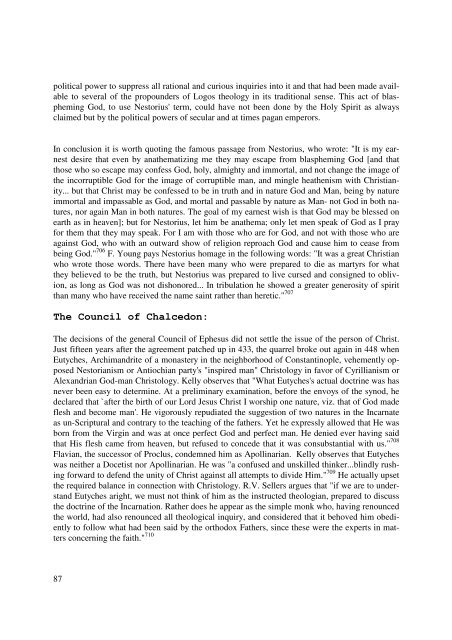Scripture and God in Christianity
Scripture and God in Christianity
Scripture and God in Christianity
You also want an ePaper? Increase the reach of your titles
YUMPU automatically turns print PDFs into web optimized ePapers that Google loves.
political power to suppress all rational <strong>and</strong> curious <strong>in</strong>quiries <strong>in</strong>to it <strong>and</strong> that had been made available<br />
to several of the propounders of Logos theology <strong>in</strong> its traditional sense. This act of blasphem<strong>in</strong>g<br />
<strong>God</strong>, to use Nestorius' term, could have not been done by the Holy Spirit as always<br />
claimed but by the political powers of secular <strong>and</strong> at times pagan emperors.<br />
In conclusion it is worth quot<strong>in</strong>g the famous passage from Nestorius, who wrote: "It is my earnest<br />
desire that even by anathematiz<strong>in</strong>g me they may escape from blasphem<strong>in</strong>g <strong>God</strong> [<strong>and</strong> that<br />
those who so escape may confess <strong>God</strong>, holy, almighty <strong>and</strong> immortal, <strong>and</strong> not change the image of<br />
the <strong>in</strong>corruptible <strong>God</strong> for the image of corruptible man, <strong>and</strong> m<strong>in</strong>gle heathenism with <strong>Christianity</strong>...<br />
but that Christ may be confessed to be <strong>in</strong> truth <strong>and</strong> <strong>in</strong> nature <strong>God</strong> <strong>and</strong> Man, be<strong>in</strong>g by nature<br />
immortal <strong>and</strong> impassable as <strong>God</strong>, <strong>and</strong> mortal <strong>and</strong> passable by nature as Man- not <strong>God</strong> <strong>in</strong> both natures,<br />
nor aga<strong>in</strong> Man <strong>in</strong> both natures. The goal of my earnest wish is that <strong>God</strong> may be blessed on<br />
earth as <strong>in</strong> heaven]; but for Nestorius, let him be anathema; only let men speak of <strong>God</strong> as I pray<br />
for them that they may speak. For I am with those who are for <strong>God</strong>, <strong>and</strong> not with those who are<br />
aga<strong>in</strong>st <strong>God</strong>, who with an outward show of religion reproach <strong>God</strong> <strong>and</strong> cause him to cease from<br />
be<strong>in</strong>g <strong>God</strong>." 706 F. Young pays Nestorius homage <strong>in</strong> the follow<strong>in</strong>g words: "It was a great Christian<br />
who wrote those words. There have been many who were prepared to die as martyrs for what<br />
they believed to be the truth, but Nestorius was prepared to live cursed <strong>and</strong> consigned to oblivion,<br />
as long as <strong>God</strong> was not dishonored... In tribulation he showed a greater generosity of spirit<br />
than many who have received the name sa<strong>in</strong>t rather than heretic." 707<br />
The Council of Chalcedon:<br />
The decisions of the general Council of Ephesus did not settle the issue of the person of Christ.<br />
Just fifteen years after the agreement patched up <strong>in</strong> 433, the quarrel broke out aga<strong>in</strong> <strong>in</strong> 448 when<br />
Eutyches, Archim<strong>and</strong>rite of a monastery <strong>in</strong> the neighborhood of Constant<strong>in</strong>ople, vehemently opposed<br />
Nestorianism or Antiochian party's "<strong>in</strong>spired man" Christology <strong>in</strong> favor of Cyrillianism or<br />
Alex<strong>and</strong>rian <strong>God</strong>-man Christology. Kelly observes that "What Eutyches's actual doctr<strong>in</strong>e was has<br />
never been easy to determ<strong>in</strong>e. At a prelim<strong>in</strong>ary exam<strong>in</strong>ation, before the envoys of the synod, he<br />
declared that `after the birth of our Lord Jesus Christ I worship one nature, viz. that of <strong>God</strong> made<br />
flesh <strong>and</strong> become man'. He vigorously repudiated the suggestion of two natures <strong>in</strong> the Incarnate<br />
as un-Scriptural <strong>and</strong> contrary to the teach<strong>in</strong>g of the fathers. Yet he expressly allowed that He was<br />
born from the Virg<strong>in</strong> <strong>and</strong> was at once perfect <strong>God</strong> <strong>and</strong> perfect man. He denied ever hav<strong>in</strong>g said<br />
that His flesh came from heaven, but refused to concede that it was consubstantial with us." 708<br />
Flavian, the successor of Proclus, condemned him as Apoll<strong>in</strong>arian. Kelly observes that Eutyches<br />
was neither a Docetist nor Apoll<strong>in</strong>arian. He was "a confused <strong>and</strong> unskilled th<strong>in</strong>ker...bl<strong>in</strong>dly rush<strong>in</strong>g<br />
forward to defend the unity of Christ aga<strong>in</strong>st all attempts to divide Him." 709 He actually upset<br />
the required balance <strong>in</strong> connection with Christology. R.V. Sellers argues that "if we are to underst<strong>and</strong><br />
Eutyches aright, we must not th<strong>in</strong>k of him as the <strong>in</strong>structed theologian, prepared to discuss<br />
the doctr<strong>in</strong>e of the Incarnation. Rather does he appear as the simple monk who, hav<strong>in</strong>g renounced<br />
the world, had also renounced all theological <strong>in</strong>quiry, <strong>and</strong> considered that it behoved him obediently<br />
to follow what had been said by the orthodox Fathers, s<strong>in</strong>ce these were the experts <strong>in</strong> matters<br />
concern<strong>in</strong>g the faith." 710<br />
87
















